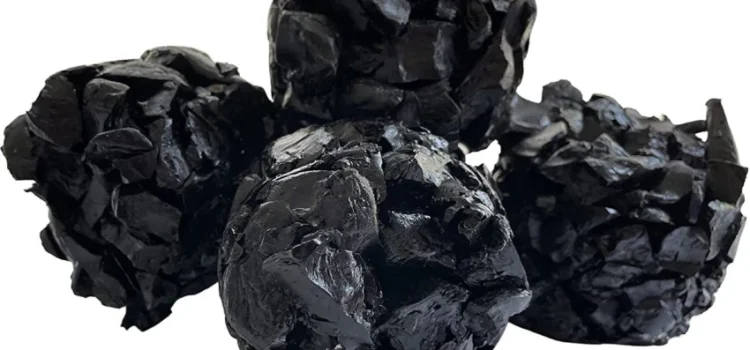Health Benefits of Shilajit & Its Nutritional Composition
Shilajit, also known as mineral pitch or mumijo, is a sticky, tar-like substance that oozes out from the cracks of rocks in mountainous regions, especially in the Himalayas. It has been used in traditional Ayurvedic medicine for centuries and is believed to offer various health benefits. However, it’s important to note that scientific research on Shilajit is still ongoing, and more studies are needed to fully understand its effects. Here are some potential health benefits of Shilajit based on existing research and traditional use:
1. Rich in Nutrients:
Shilajit contains a wide range of minerals, fulvic acid, humic acid, and other organic compounds. These nutrients can support overall health and well-being.
2. Antioxidant Properties:
Shilajit is known to have antioxidant properties, which means it can help neutralize harmful free radicals in the body. Antioxidants are essential for reducing oxidative stress and preventing cellular damage.
3. Supports Cognitive Function:
Some studies suggest that Shilajit may have a positive impact on cognitive function and memory. It is believed to promote brain health and potentially help with age-related cognitive decline.
4. Enhances Energy and Stamina:
Traditionally, Shilajit has been used to boost energy levels and increase stamina. It may help in reducing fatigue and improving physical performance.
5. Supports Male Reproductive Health:
In Ayurvedic medicine, Shilajit has been used to support male reproductive health. It is believed to enhance fertility, increase testosterone levels, and improve sperm quality.
6. Anti-Inflammatory Properties:
Shilajit’s anti-inflammatory properties may help reduce inflammation in the body and alleviate symptoms related to certain inflammatory conditions.
7. May Aid in Managing Diabetes:
Some studies suggest that Shilajit may have a role in managing diabetes by improving blood glucose levels and lipid profiles.
8. Supports Heart Health:
Shilajit is believed to have a positive impact on heart health by reducing lipid levels and supporting cardiovascular function.
9. Enhances Immune System:
Shilajit’s immunomodulatory properties may help strengthen the immune system and increase the body’s resistance to infections.
10. Anti-Aging Benefits:
Due to its antioxidant content, Shilajit is considered to have anti-aging properties. It may help reduce the signs of aging and promote skin health.
While Shilajit shows promising potential for various health benefits, it is essential to use it responsibly and consult with a healthcare professional before starting any supplement regimen. The quality and purity of Shilajit products can vary, so it’s crucial to source it from reputable and reliable sources. Pregnant or breastfeeding women, as well as individuals with specific health conditions, should exercise caution and seek medical advice before using Shilajit.
Nutrient Value of Silajeet
Shilajit is a unique substance that contains a complex mixture of minerals, fulvic acid, humic acid, and other organic compounds. The exact nutrient composition can vary depending on the geographical location and the specific source of Shilajit. Here are some of the key nutrients found in Shilajit:
1. Minerals:
Shilajit is rich in various minerals that are essential for overall health. Some of the minerals commonly found in Shilajit include:
- Iron
- Zinc
- Copper
- Magnesium
- Manganese
- Potassium
- Calcium
- Sodium
- Phosphorus
2. Fulvic Acid:
Fulvic acid is a type of organic acid that plays a crucial role in nutrient absorption and transportation. It is known for its antioxidant and anti-inflammatory properties.
3. Humic Acid:
Humic acid is another organic acid present in Shilajit, which has been associated with various health benefits, including improved digestion and immune system support.
4. Dibenzo-alpha-Pyrones:
Shilajit contains dibenzo-alpha-pyrones, which are believed to have positive effects on the central nervous system and cognitive function.
5. Triterpenes:
Triterpenes are bioactive compounds that contribute to the potential health benefits of Shilajit, including its anti-inflammatory and antioxidant properties.
6. Amino Acids:
Shilajit contains certain amino acids, which are the building blocks of proteins and play a vital role in various physiological processes.
7. Vitamins:
While Shilajit is not a significant source of vitamins, it may contain trace amounts of certain vitamins, such as vitamin C and vitamin E.
It’s important to note that the nutrient content of Shilajit can vary depending on factors like the region where it is sourced and the method of extraction. Additionally, some products labeled as “Shilajit” in the market may contain additives or fillers, so it’s essential to choose a reputable and trustworthy source to ensure the purity and authenticity of the product.
As with any supplement or natural product, it is recommended to consult with a healthcare professional before using Shilajit, especially if you have any underlying health conditions or are taking medications. A qualified healthcare provider can help determine if Shilajit is suitable for you and provide appropriate guidance on its use.






